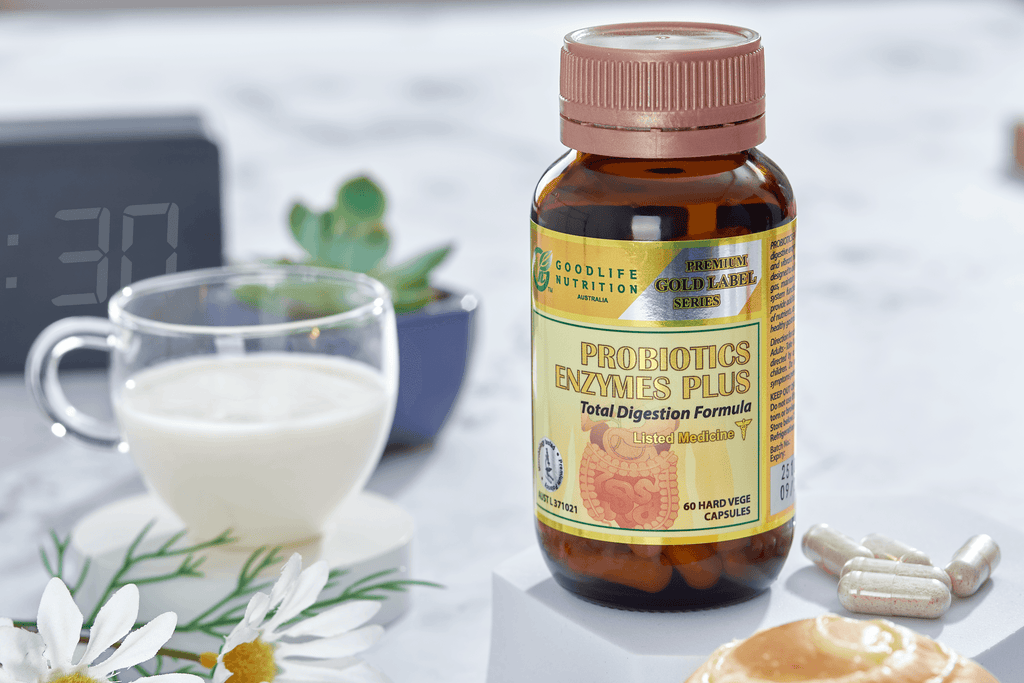PROBIOTICS ENZYMES PLUS TOTAL DIGESTION FORMULA

What is Probiotic?
Probiotics are a combination of live beneficial bacteria and/or yeasts that naturally live in your body. Probiotics are made up of good bacteria that helps keep your body healthy and working well. There are numerous families of probiotic microorganisms in our gut, but four in particular are predominant and important for our health. They’re represented by the following groups of related organisms: Lactobacillus, Bifidobacterium, Streptococcus, and Saccharomyces, a probiotic yeast. These are the microorganisms you’ll most often find in probiotic supplements, because they have the most supporting research. There are also specialized strains of certain species that offer specific benefits for our health and well-being. Probiotics helps you in many ways, including supporting general gut needs and specific health needs such as immunity and digestion.
Prebiotics are a source of food for your gut’s healthy bacteria. They are the carbohydrates your body cannot digest. So they go to your lower digestive tract, where they act as food to help the healthy bacteria grow. Prebiotics include fibre-rich foods like whole grains, beans and legumes, fruits and vegetables. Fructooligosaccharides (FOS) are a form of water-soluble carbohydrate. Composed of short fructose chains, they cannot be digested by the human body. FOS occurs naturally in some plants, including asparagus, onion, leeks, bananas, garlic and Jerusalem artichoke.
Features and Benefits:
-
Aid the digestion of fat, carbohydrate, protein and raw food
-
Encourage absorption of nutrients
-
Boost enzyme production
-
Support immune health
-
Bring balance back to the gut
HOW IT WORKS
-
Lactobacillus plantarum, a clinically trialled probiotic strain specifically formulated to help relieve and manage symptoms of medically diagnosed irritable bowel syndrome (IBS).
-
Saccharomyces boulardii is a probiotic yeast that survives stomach acid and colonizes the intestinal tract. It promotes the health of the intestinal tract, helps to encourage a healthy gut flora balance, and supports a balanced inflammatory response. Saccharomyces boulardii has also been shown to support proper gastrointestinal function during a disruption to the normal balance of gut flora.
-
Fructooligosaccharides (FOS) is a group of naturally occurring carbohydrates that can help promote the growth of beneficial flora in the gastrointestinal tract. The body normally maintains a balance of "friendly" flora in the intestines; unfortunately factors such as improper diet, stress, gastrointestinal problems, and use of antibiotics may disrupt this delicate balance. FOS are long chain sugars that are indigestible by humans, but serve as "food" for friendly flora helping to increase their numbers in the body.
-
Amylase is the enzyme that breaks down carbohydrates such as starch and glycogen, a storage form of glucose.
-
Cellulase is the enzyme that helps free the nutrients found in both fruits and vegetables by breaking down cellulose, a plant fiber.
-
Lipase is the main enzyme responsible for breaking down fats. Lipases hydrolyse triglycerides (fats) into their component fatty acid and glycerol molecules.
-
Protease is the enzymes whose catalytic function is to hydrolyse (breakdown) peptide bonds of proteins.
-
Lactase is the enzyme that is necessary for the proper utilization and digestion of lactose, the predominant sugar found in milk and other dairy products.

REFERENCES
-
Ramirez FC, Lee K, Graham DY. 1994. All lactase preparations are not the same: results of a prospective, randomized, placebo-controlled trial. The American Journal of Gastroenterology 89(4):566-570.
-
Ianiro G, Pecere S, Giorgio V, Gasbarrini A, Cammarota G. Digestive Enzyme Supplementation in Gastrointestinal Diseases. Curr Drug Metab. 2016;17(2):187-93.
-
Akinfemiwa O, Muniraj T. Amylase. [Updated 2021 Mar 7]. In: StatPearls [Internet]. Treasure Island (FL): StatPearls Publishing; 2021 Jan-. Available from: https://www.ncbi.nlm.nih.gov/books/NBK557738/
-
Murray MT. Encyclopedia of Nutritional Supplements: The Essential Guide for Improving Your Health Naturally. New York (NY): Three Rivers Press; 1996.
-
Elms J, Fishwick D, Walker J, Rawbone R, Jeffrey P, Griffin P, Gibson M, Curran AD. Prevalence of sensitisation to cellulase and xylanase in bakery workers. Occupational and Environmental Medicine 2003;60(10):802-804.
-
V. Rousseau, J. P. Lepargneur, C. Roques, M. Remaud-Simeon, F. Paul; Lepargneur; Roques; Remaud-Simeon; Paul (2005). "Prebiotic effects of oligosaccharides on selected vaginal lactobacilli and pathogenic microorganisms". Anaerobe. 11 (3): 145–153.
-
Moslehi-Jenabian, S.; Lindegaard, L.; Jespersen, L. Beneficial Effects of Probiotic and Food Borne Yeasts on Human Health. Nutrients 2010, 2, 449-473.
-
Kaźmierczak-Siedlecka K, Daca A, Folwarski M, Witkowski JM, Bryl E, Makarewicz W. The role of Lactobacillus plantarum 299v in supporting treatment of selected diseases. Cent Eur J Immunol. 2020;45(4):488-493.
-
Altadill T, Espadaler-Mazo J, Liong MT. Effects of a Lactobacilli Probiotic on Reducing Duration of URTI and Fever, and Use of URTI-Associated Medicine: A Re-Analysis of a Randomized, Placebo-Controlled Study. Microorganisms. 2021 Mar 4;9(3):528.

Leave a comment